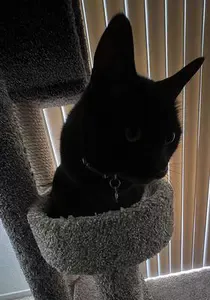Feline Acne Treatment
Feline acne treatment, in mild cases, is usually not necessary. In fact, over-treatment is believed to lead to more severe skin lesions.
In mild, asymptomatic cases of feline acne, treatment is typically not necessary. Your veterinarian may recommend topical therapy of some kind to help remove the comedones (blackheads). Depending upon the severity, more aggressive treatment may be recommended.
Treatment may include the use of antiseptics, such as alcohol or Listerine. It has been found that it is often helpful to use antiseborrheic shampoos. Some of these contain salicylic acid, which is a common component of human acne treatment formulas.
Your vet may also clip excess skin from the lesion area. This will facilitate cleaning, as well as the application of topical medications. (Never do this yourself as you can hurt your cat or cause an infection.)
Benzoyl peroxide solutions are often used as a topical treatment in shampoo or gel form. While this may be effective, you should note that benzoyl peroxide preparations made for small animals are 2.5%, and those for humans are 5%.
Do not use a human preparation on your cat unless instructed to do so by your veterinarian. In either case, benzoyl peroxide treatments may be irritating to your cat's skin when used repeatedly over time.
In more serious cases, there may be a secondary bacterial infection present. Signs of this may include edema (swelling) of the chin area, or drainage of the lesions. In these cases, antibiotics, both systemic (taken internally) and topical, may be prescribed.
Hot compresses, possibly with Epsom salts may be recommended to draw out the infection. I highly doubt that any of my cats would put up with this sort of abuse, though! Some cats may be more agreeable.
There is also the possibility that other conditions, such as ringworm, or yeast infections in the chin area may appear to be feline acne, but in fact are not. Your vet can perform tests, including a biopsy if necessary, to be sure. Treatment would depend upon the actual diagnosis.
Some additional details on feline acne treatment:
Topical antibacterial agents commonly prescribed for treatment of feline acne include mupirocin and clindamycin ointments. These are used "off-label" - meaning that they are not labeled for use on cats, but your veterinarian may prescribe them anyway. Make sure you talk to your vet about what this means.
Some of the systemic antibiotics that are often effective include amoxicillin, enrofloxacin, and cephalosporins.
In addition, fatty acid supplements have been used to help prevent recurring lesions, or at least minimize their severity. In cases where patients are immune compromised, such as a feline AIDS patient, treatment may include steroid therapy. Additional supplements may be used as well.
Cat Illness Symptoms
Cat Health
Cat Lovers Only


Comments: What do you think?
Have your say about what you just read. Leave me a comment in the box below.